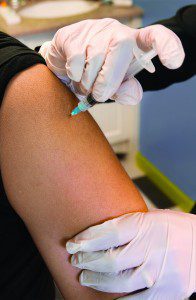 It’s that time of year again. Flu season begins in the fall and often ends in the spring. Getting a flu vaccine every year is the single best thing you can do to protect yourself and your family. We make it easy to get your flu vaccine.
It’s that time of year again. Flu season begins in the fall and often ends in the spring. Getting a flu vaccine every year is the single best thing you can do to protect yourself and your family. We make it easy to get your flu vaccine.
Who Should Get the Flu Vaccine?
Everyone 6 months of age and older should get a flu vaccine every season. In the State of Florida, pharmacists are allowed to administer the flu vaccine patients 18 years of age and older.
Why Should People Get Vaccinated Against the Flu?
Influenza is a serious disease that can lead to hospitalization and sometimes even death. “Flu season” in the United States can begin as early as October and last as late as May. Every flu season is different, and influenza infection can affect people differently. Even healthy people can get very sick from the flu and spread it to others. During recent flu seasons, between 80% and 90% of flu related deaths have occurred in people 65 years and older.
During flu season, viruses are circulating at higher levels in the U.S. population. An annual seasonal flu vaccine is the best way to reduce the chances that you will get seasonal flu and spread it to others.
Why Do I Need a Flu Vaccine Every Year?
A flu vaccine is needed every season for two reasons. First, the body’s immune response from vaccination declines over time, so an annual vaccine is needed for optimal protection. Second, because flu viruses are constantly changing, the formulation of the flu vaccine is reviewed each year and sometimes updated to keep up with changing flu viruses.
How Do Flu Vaccines Work?
Flu vaccines cause antibodies to develop in the body about two weeks after vaccination. These antibodies provide protection against infection with the viruses that are in the vaccine. Because it can take up to two weeks for the vaccine to take full effect, patients should not wait until November or December to get vaccinated. We start to vaccinate in September and encourage our patients to receive a flu vaccine by the end of October.
The seasonal flu vaccine protects against the influenza viruses that research indicates will be most common during the upcoming season. Traditional flu vaccines (called “trivalent” vaccines) are made to protect against three flu viruses; an influenza A (H1N1) virus, an influenza A (H3N2) virus, and an influenza B virus.
For patients aged 65 and older, a high dose flu vaccine is available and fully covered by Medicare. This has been on the market for several years now.
Are You at Risk for Developing Shingles?
Your risk of shingles and post-herpetic neuralgia (PHN) increases as you get older. CDC recommends that people aged 60 years and older receive a shingles vaccine to prevent shingles and PHN.
Shingles vaccine has been used since 2006. Zostavax® is the only shingles vaccine currently approved for use in the United States. This vaccine reduces the risk of developing shingles by 51% and PHN by 67%. Zostavax® can reduce the duration and severity of shingles if a patient does develop symptoms. It is given in one dose as a shot, and can be administered in a doctor’s office or pharmacy.
Who Should Get Shingles Vaccine?
People 60 years of age or older should get a shingles vaccine. They should get the vaccine whether or not they recall having had chickenpox, which is caused by the same virus as shingles. Studies show that more than 99% of Americans aged 40 and older have had chickenpox, even if they don’t remember getting the disease. There is no maximum age for getting shingles vaccine.
The shingles vaccine is covered, in part, by all Medicare Part D drug plans. For most patients aged 65 and older, only one shingles vaccine is needed in their lifetime.
Even if you have had shingles, you can still receive the shingles vaccine to help prevent future occurrences of the disease. There is no specific length of time you must wait after having shingles before receiving the shingles vaccine, but generally you should make sure the shingles rash has disappeared before getting vaccinated.
Talk with your healthcare provider, including your pharmacist, if you have questions about the shingles vaccine. The shingles vaccine is available in doctor’s offices and pharmacies.
How Well Does Shingles Vaccine Work?
Zostavax®, the shingles vaccine, reduced the risk of shingles by 51% and the risk of post-herpetic neuralgia by 67% based on a large study of more than 38,000 adults aged 60 years or older.
If you have any questions about either the flu or the shingles vaccine, or if you would like get vaccinated, stop by the pharmacy – no appointment necessary for vaccines.
Naples Pharmacy
(239) 231-3026
848 1st Avenue North, Suite 120, Naples, FL 34102
(Next to Wynn’s Market)









